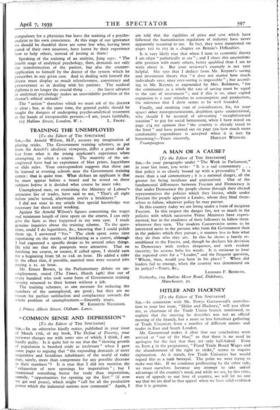TRAINING THE UNEMPLOYED [To the Editor of THE SPECTATOR] SIR,—Sit
Arnold Wilson, M.P., accuses my imagination of playing tricks. The Government training schemes, as put from Sir Arnold's idealistic viewpoint, differ a great deal in fact from what is the young applicant's experience when attempting to select a course. The majority of the un- emp:oyed have had no experience of blue prints, logarithms or slide rules. Your correspondent suggests that these can be learned at evening schools near the Government training centre that is quite true. What disbars an applicant is that. he must appear before a board and be tested on these subjects before it is decided what course he must take.
Unemployed men, on examining the Ministry of Labour's attractive list of trades, have said to me, " That's all right before you're tested, afterwards you're a bricklayer."
I did not state in my article that special knowledge was necessary for sheet metal working.
Against Sir Arnold Wilson's figures concerning the wages and minimum length of time spent on the course, I can only give the facts as they happened in my own case. I made genuine inquiries about the training scheme. To the ques- tions, could I do logarithms, &c., knowing that I could polish them up, I answered " Yes." The clerk- spent some time expatiating on the merits of bricklaying as a career, although I had expressed a specific desire to be several other things. He told me that the prospects were attractive. That on finishing my course, or sooner, if called upon, I should earn for a beginning from 7d. to rid. an hour. He added a rider to the effect that, if possible, married men were secured jobs paying a is. an hour.
Mr. Ernest Brown, in the Parliamentary debate on un- employment, stated (The Times, March r4th) that out of every hundred who took some form of Government training 'eventy returned to their homes without a job.
The training schemes, as one measure for reducing the numbers of the unemployed, are good ; but they are no reason for perfect satisfaction and complacency towards the whole problem of unemployment.—Sincerely yours, W. KENNETH NEEDHAM.
5 Prince Albert Street. Oldham, Lancs.










































 Previous page
Previous page